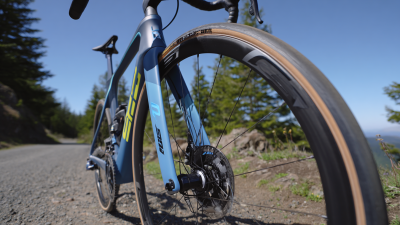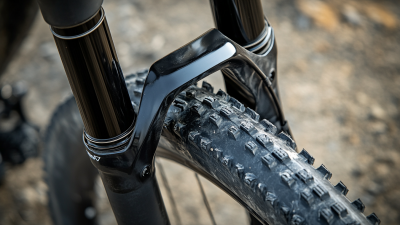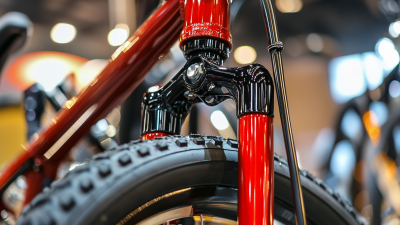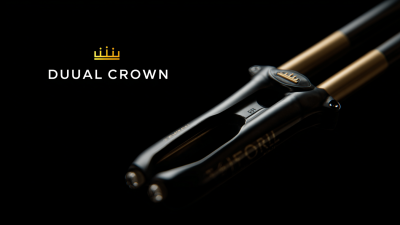In the realm of custom bike builds, Bicycle Chopper Forks have long been a hallmark of personalized design and performance enhancement. According to the recent Global Bicycle Market Report, custom bicycle components, including forks, are experiencing a surge in demand, projected to grow by 6.7% annually over the next five years. As enthusiasts seek to push the boundaries of creativity and functionality, exploring unique alternatives to traditional Bicycle Chopper Forks has become essential. This journey not only caters to aesthetic preferences but also addresses factors such as weight reduction, improved handling, and customization for diverse riding styles. As bike builders strive for innovation, it’s important to consider the wide array of alternative fork designs that can elevate the overall biking experience, allowing for a truly unique ride that stands out in both performance and style.

When it comes to custom bike builds, the fork is not just a functional component; it defines the overall aesthetic and ride experience. While traditional chopper forks have long been a staple in the custom bike scene, innovative designs are emerging, offering riders unique alternatives that enhance both style and performance. From springer forks that provide a classic look with modern comforts, to monoshock forks that deliver superior suspension and handling, builders have a wealth of options at their fingertips.

One novel alternative gaining popularity is the use of inverted forks, typically seen in high-performance motorcycles. Their distinctive look and ability to enhance stability and cornering efficiency make them an intriguing choice for custom builds. Additionally, builders are experimenting with custom-designed forks made from unconventional materials, such as carbon fiber or aluminum alloys, which not only reduce weight but also allow for intricate designs that can truly set a bike apart. Embracing these innovative fork designs can lead to original creations that break free from the traditional chopper mold, paving the way for a new wave of creative bike builds.
When it comes to customizing your bike, the choice of fork material plays a crucial role in performance, durability, and aesthetics.
 Steel, aluminum, and carbon each bring unique properties to the table. Steel forks are known for their strength and comfort, absorbing road vibrations effectively, which enhances the riding experience. However, they tend to be heavier, making them less suited for competitive cycling.
Steel, aluminum, and carbon each bring unique properties to the table. Steel forks are known for their strength and comfort, absorbing road vibrations effectively, which enhances the riding experience. However, they tend to be heavier, making them less suited for competitive cycling.
On the other hand, aluminum offers a lightweight alternative that doesn’t compromise on rigidity, making it a popular choice for performance-oriented builds. It's also more affordable and resistant to corrosion. However, aluminum forks can transmit more road vibration, potentially leading to a less comfortable ride on rough terrain.
Carbon fiber forks stand out for their exceptional strength-to-weight ratio and their ability to dampen vibrations more effectively than both steel and aluminum. They are the go-to option for high-end builds, but they come with a higher price tag.
Tip: When selecting a fork material, consider your riding style and the terrains you frequently navigate. For city commuting, a steel fork might provide the comfort you need, while serious racers may benefit from the performance of a carbon fork. Always test ride different options if possible, as personal preference plays a significant role in comfort and performance.
When it comes to customizing bikes, the choice of fork is pivotal, as it impacts both functionality and aesthetics. According to a study by the National Bicycle Dealers Association (NBDA), nearly 45% of bike enthusiasts prioritize aesthetics when selecting components for their custom builds. This trend highlights the importance of a fork that not only performs well but also complements the overall design of the bike. Unique alternatives to traditional bicycle chopper forks, such as triathlete forks or custom suspension options, can elevate a bike's appearance while catering to specific riding styles.
Functionality is equally crucial, especially for those who plan to ride extensively. A report from the International Mountain Bicycling Association (IMBA) found that 68% of mountain bikers prioritize fork performance, indicating that responsiveness and durability are key factors in their decisions. Forks designed for different terrains, like rigid forks for smooth trails or suspension forks for rugged paths, exemplify this balance. Riders must assess their typical riding environment and personal style to select the fork that will enhance their experience while matching their aesthetic preferences. This interplay between form and function is what makes each bike build truly unique.
When embarking on a custom bike build, one of the most striking features is the fork design. While chopper forks are iconic, their cost can be prohibitive for budget-conscious builders. Exploring alternatives can open up creative possibilities without sacrificing style or functionality.
Consider using vintage BMX forks or cruiser forks as budget-friendly substitutes. These alternatives provide similar aesthetics while being much more affordable. When searching for these forks, check local shops or online marketplaces for second-hand options, which can save a significant amount of money while allowing you to customize your bike.
Tip: Always research the compatibility of the fork with your bike frame to ensure a safe and secure fit. Additionally, you might contemplate doing some DIY modifications, such as painting or adding custom graphics, to personalize your new forks.
Another option is to look into DIY fork designs. If you have a flair for fabrication, creating your own forks from lightweight materials can be a fun project. This way, you can achieve a unique look tailored specifically to your bike, often at a fraction of the cost of ready-made chopper forks.
| Alternative Type | Material | Weight (lbs) | Cost ($) | Durability |
|---|---|---|---|---|
| Steel Rigid Fork | Steel | 5.0 | 150 | High |
| Aluminum Fork | Aluminum | 3.5 | 120 | Medium |
| Carbon Fork | Carbon Fiber | 2.5 | 300 | Very High |
| Suspension Fork | Alloy | 4.2 | 180 | High |
| Custom Built Fork | Mixed Materials | 4.0 | 250 | Variable |
Custom bike builds offer enthusiasts a fantastic opportunity to express their individuality, and the choice of fork plays a pivotal role in defining a bike's character. While traditional bicycle chopper forks have established themselves as a classic choice, exploring unique alternatives can significantly enhance the customization potential of a bicycle. Options like rigid forks with unconventional geometries, carbon fiber designs, or even vintage-inspired materials provide cyclists with new avenues to not only improve handling but also to create a distinctive look that represents their personal style.
The customization of bike forks goes beyond aesthetics; it impacts the riding experience as well. Unique fork designs can improve performance by optimizing the bike's geometry and enhancing stability. For instance, a wider stance or an adjustable angle can affect the responsiveness of the ride, allowing builders to tailor their bike to their specific needs and preferences. This seamless blend of form and function ensures that each custom bike becomes a true reflection of its owner's personality, inviting deeper engagement in the world of cycling while celebrating individuality in every ride.






